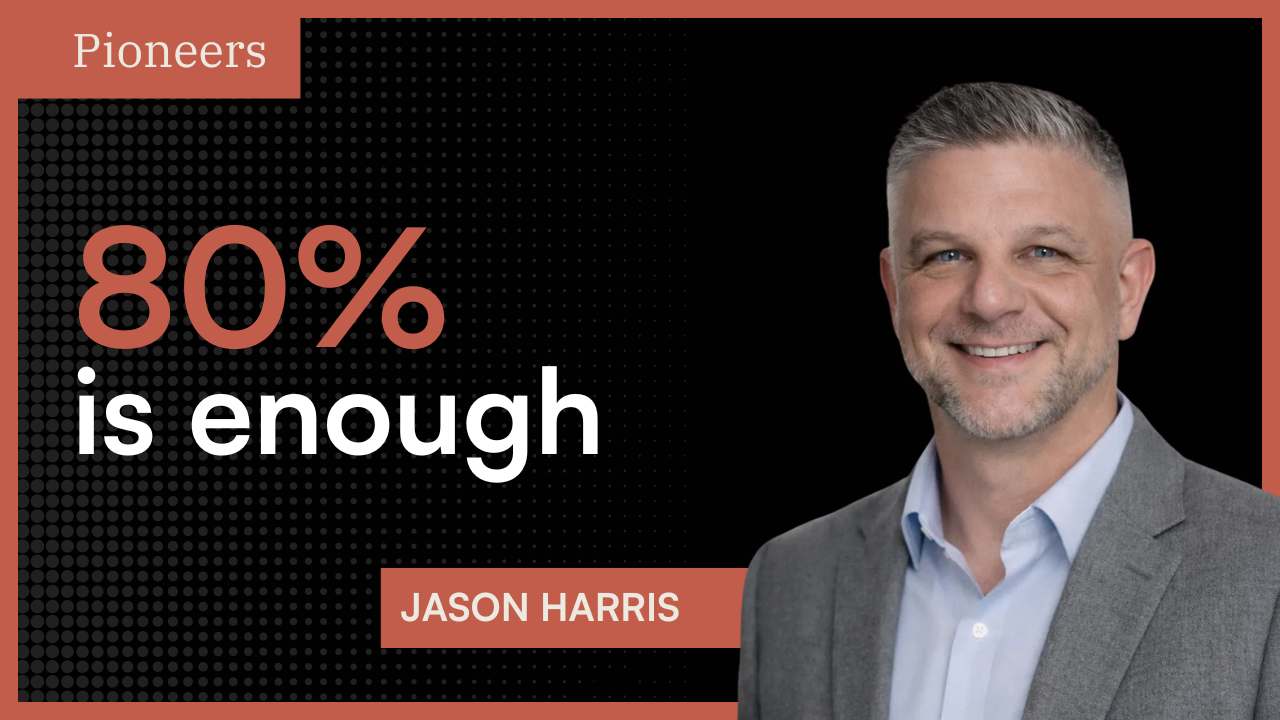This is a summary of an episode of Pioneers, an educational podcast on AI led by our founder. Join 2,000+ business leaders and AI enthusiasts and be the first to know when new episodes go live. Subscribe to our newsletter here.
TLDR:
- Successful AI implementation requires balancing innovation with established business processes and aligning goals and responsibilities among stakeholders.
- Stakeholder management is crucial, involving meeting people where they are and building credibility and empathy to connect effectively.
- Here are the three pillars of stakeholder engagement: technology, process, and experience.
- Implementation should initially focus on small, contained scopes, then iterating and scaling.
- Finding enthusiastic early adopters is key to successful AI integration, rather than forcing adoption.
Before we dive into the key takeaways from this episode, be sure to catch the full episode here:
George Yuhasz’s Journey in AI and Analytics
George Yuhasz, Senior Technical Leader for a global healthcare company and member of Multimodal's Advisory Board, shared his perspectives on integrating generative AI in healthcare, managing diverse stakeholders, and navigating the complexities of technology adoption in a highly regulated industry.
George's career began far from the world of data and AI. Starting in theater, he took an unexpected turn into psychology and statistics. This diverse background fueled his desire to challenge the status quo in data analytics.
The pivotal moment came when George recognized the untapped potential of data analytics in healthcare. By focusing on data-driven strategies and patient-centric solutions, he began reshaping how healthcare analytics were developed and delivered.
His approach required not only a deep understanding of traditional healthcare processes but also a willingness to advocate for innovative technologies.
The Role of AI in Modernizing Healthcare
AI is reshaping healthcare by analyzing vast data sets, predicting outcomes, and automating complex tasks, changing how organizations operate, assess risks, and interact with patients.
One of the most significant impacts of AI in healthcare is on analytics and decision support.
AI algorithms can process and analyze data more comprehensively and accurately than traditional methods, leading to more precise diagnoses and treatment plans. This capability allows healthcare providers to offer more personalized care, tailored to individual patient profiles.
AI is also enhancing patient care by providing 24/7 support, answering queries, and assisting in treatment monitoring. This improves patient experience and frees healthcare professionals for more complex cases.
The Challenges of AI in Healthcare Analytics
The healthcare industry's resistance to change and complex regulations pose major challenges.
Deep-rooted practices slow down the adoption of new technology, while varying regulations make compliance difficult during innovation.
Overcoming AI Adoption Challenges
George identifies several hurdles in adopting generative AI:
- Balancing developers’ enthusiasm with end-users' skepticism in order to find the middle ground that addresses concerns while leveraging opportunities
- Identifying suitable areas and workflows for implementation
- Coordinating efforts across multiple stakeholders, ensuring alignment and buy-in from various departments and levels of management
To address these challenges, he emphasizes:
- Demonstrating credibility and clarity in messaging, using language and examples that resonate with different stakeholder groups
- Clearly explaining benefits and value to stakeholders, tailoring the message to address specific concerns and goals of each group
- Creating opportunities for stakeholders to partner and lead in the implementation process, fostering a sense of ownership and engagement
The Opportunities of AI in Healthcare Analytics
Despite challenges, there are substantial AI opportunities in healthcare. The demand for personalized solutions allows providers to innovate and stand out, offering faster service and better patient interactions. Technology can streamline operations, reduce costs, automate routine tasks, improve diagnosis accuracy, and enhance treatment planning.
The Impact of Gen AI in Healthcare
George notes that generative AI has brought significant changes while reinforcing existing principles:
- AI technology is now widely accessible, democratizing powerful analytical tools
- Healthcare organizations must maintain rigorous standards and manage risks to ensure patient safety and data privacy
- While consumers quickly adopt AI, healthcare requires a cautious, balanced approach to innovation
Implementation Strategies for Generative AI
When implementing generative AI, George recommends:
- Starting with low-risk experiments and non-controversial applications to build confidence and demonstrate value
- Focusing on demonstrating tangible value to overcome skepticism, using metrics and case studies to illustrate benefits
- Utilizing product management methodologies to form and test hypotheses, ensuring a structured approach to innovation
- Avoiding the "solution in search of a problem" approach by closely aligning AI initiatives with specific business needs and challenges
"I think this is where having good product management methodologies and good discipline about understanding capabilities, forming hypotheses, being able to rapidly test and then using some type of definition like value statement or metrics to prove or disprove those assumptions. I think that discipline serves you very well here.”
- George Yuhasz

Stakeholder Management in a Global Healthcare Organization
Yuhasz emphasizes two key principles in managing diverse stakeholders:
- Meeting stakeholders where they are, which involves understanding their unique perspectives, challenges, and goals
- Adapting communication styles to effectively convey ideas and build consensus across different departments and levels of the organization
He identifies three pillars for effective stakeholder engagement:
- Technology (capabilities, infrastructure, ecosystem): Understanding and communicating the technical aspects of solutions in a way that resonates with different stakeholders
- Process (workflows, services, corporate structure): Aligning new initiatives with existing processes and organizational structures to ensure smooth implementation
- Experience (personalized or shared experiences): Focusing on how new solutions will impact individual and team experiences, addressing concerns and highlighting benefits

Building Credibility and Trust
One of the key strategies Yuhasz employs is building a robust "toolbox of credibility." This involves demonstrating expertise across various scenarios and problem-solving approaches. It's not just about showcasing technical prowess; it's about proving that you understand the stakeholders' specific challenges and can provide solutions that align with their goals.
George stressed the importance of empathy in this process.
"Being empathetic and sympathetic to the stakeholder you're working with... that's how you connect as human beings and then join forces to solve problems.”
- George Yuhasz
This human-centric approach is crucial in an industry where decisions can have profound impacts on patient care and outcomes.
Balancing Global Strategy with Local Needs
A key challenge in global stakeholder management is balancing organizational strategies with local needs and regulations. In order to ensure AI and analytics solutions are adaptable to regional requirements while maintaining consistency and quality, there is a requirement for creating flexible frameworks that can be customized for different markets without compromising core functionality or regulatory compliance.
Future Considerations
As organizations continue to implement generative AI, George highlights the importance of:
- Managing cultural change, recognizing that successful AI adoption requires shifts in mindset and working practices across the organization
- Developing proficiency in new technologies, investing in training and development to ensure teams can effectively leverage AI tools
- Striking a balance between innovation and regulatory compliance, staying ahead of the curve while adhering to healthcare industry regulations
By focusing on these areas, healthcare organizations can effectively leverage generative AI while navigating the complex landscape of regulations and stakeholder expectations.
.svg)



.svg)
.svg)

.svg)



